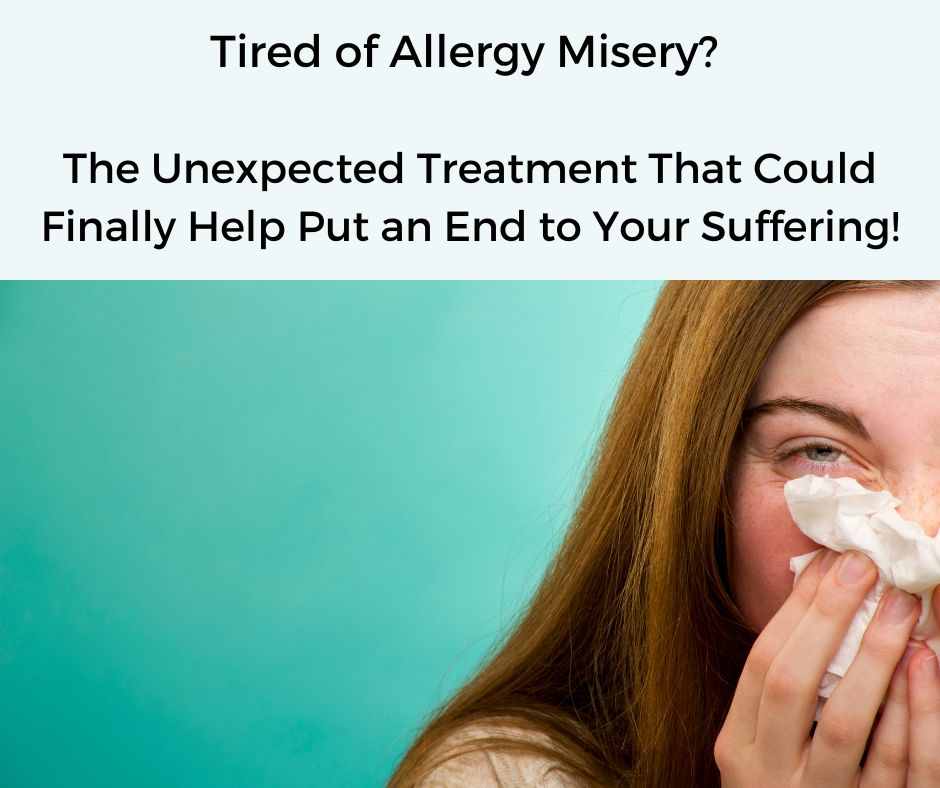Allergy Season
Are you tired of sneezing, itching, and feeling miserable every allergy season? What if there was a ground breaking treatment that could potentially transform your life and finally put an end to your suffering?
In this must-read article, we’re going to reveal the astonishing secret of IV vitamin therapy that’s capturing the attention of allergy warriors worldwide. You won’t believe how this revolutionary approach is shaking up the allergy treatment landscape! Get ready to dive into the unbelievable world of IV vitamin therapy and discover how it could potentially change the way you manage your allergies forever. The relief you’ve been desperately seeking might be just minutes away.
Generally, there are three main allergy seasons:
Spring (March to June): During spring, tree pollen is the most common allergen. Trees such as birch, oak, elm, and maple release their pollen, causing allergic reactions for many people.
Summer (June to August): Grass pollen is the primary allergen during the summer months. Allergic reactions to grasses such as Bermuda, Timothy, and Kentucky Bluegrass are common.
Fall (September to November): Weed pollen, particularly from ragweed, is the dominant allergen during the fall season. Other weeds, such as pigweed and goosefoot, can also trigger allergies.
As we are in the thick of Spring allergy season, millions of people are fighting the onslaught of sneezing, itching, and watery eyes that accompany it. Allergies, an overreaction of the immune system to specific substances, can leave individuals feeling drained and frustrated.
While traditional allergy treatments like antihistamines and corticosteroids can provide relief for some, many are seeking alternative methods to manage their symptoms.
Allergens and the Immune Response
Allergies occur when your immune system mistakenly identifies a harmless substance, known as an allergen, as a threat. In response, your body mounts a defense against the perceived invader. This overreaction can cause various symptoms that are commonly associated with allergies.
During an allergic reaction, your immune system produces histamines and other inflammatory substances to counteract the allergens. These chemicals are responsible for the familiar allergy symptoms, such as itching, redness, and swelling.

Common Allergens and Allergy Seasons
Allergens are diverse and can vary depending on the time of year and geographical location. Pollen from trees, grasses, and weeds is a common culprit during spring, summer, and fall allergy seasons. Other allergens, like mold spores and dust mites, can cause symptoms year-round.
Allergy symptoms can range from mild to severe and may include sneezing, itchy eyes, nasal congestion, and skin rashes. These symptoms can significantly impact an individual’s quality of life, making it difficult to focus on daily tasks, enjoy outdoor activities, or even get a good night’s sleep. Finding effective ways to manage and alleviate these symptoms is crucial for those affected by allergy season.
IV vitamin therapy is an innovative treatment that administers essential vitamins and minerals directly into the bloodstream via intravenous (IV) infusion. This method bypasses the digestive system, allowing for immediate and efficient absorption of nutrients at a more therapeutic level only obtainable direct to the bloodstream. Patients receive these nutrient-packed IV drips under the guidance of a healthcare professional (like your Naturopathic Health Team!), often in specialized clinics or wellness centers.
Role of Vitamins and Minerals in the Immune System
Vitamin C: Antioxidant, Anti-inflammatory, and Histamine-Reducing Properties
Vitamin C is a potent antioxidant that plays a crucial role in supporting immune function. Its anti-inflammatory properties help combat the body’s response to allergens, reducing the severity of allergy symptoms. Additionally, Vitamin C has been shown to reduce histamine levels, the chemicals responsible for many allergy symptoms such as itching, redness, and swelling.
Other Vitamins and Minerals: B Vitamins, Magnesium, and Zinc *NAC, Glutathione and Selenium
B vitamins contribute to a healthy immune system, energy production, and brain function, helping to combat the fatigue that often accompanies allergy season. Magnesium is known for its anti-inflammatory properties and its ability to promote relaxation, which can help alleviate allergy symptoms. Zinc, a vital trace element, supports immune function and has antioxidant properties, contributing to overall immune health during allergy season.
Reducing Inflammation and Histamine Levels
By delivering a concentrated dose of essential vitamins, minerals and antioxidants directly into the bloodstream, IV vitamin therapy can help reduce inflammation and histamine levels associated with allergies. Vitamin C is a mast cell stabilizer, meaning it can moderate the release of histamines. Most allergy medications act by this mast cell stabilization. This may lead to a decrease in allergy symptoms, providing relief for those struggling with seasonal allergies.
Supporting the Immune System
A healthy immune system is critical for combating allergies effectively. IV vitamin therapy can help support the immune system by providing the essential nutrients and key antioxidants like Vitamin C, which it needs to function optimally. This targeted approach can help allergy sufferers build resilience against allergens and minimize the impact of allergy season on their daily lives.
Alleviating Fatigue and Improving Energy Levels
Allergy symptoms can be draining, leaving individuals feeling fatigued and sluggish. By delivering essential vitamins and minerals directly into the bloodstream, IV vitamin therapy can help combat fatigue and improve energy levels. This boost in energy can empower allergy sufferers to tackle their day-to-day activities with renewed vigor, despite the challenges of allergy season.
Limitations and Considerations of IV Vitamin Therapy for Allergies
It’s essential to understand that every person’s experience with allergies and response to treatments is unique. While some individuals may find significant relief from their allergy symptoms through IV vitamin therapy, others may not experience the same level of improvement. Factors such as individual nutrient deficiencies, the severity of allergy symptoms, and overall health can impact the effectiveness of IV vitamin therapy. With naturopathic medicine approach, we are able to address and understand all factors.
IV vitamin therapy should not be considered a cure for allergies. Instead, it should be viewed as a supplementary treatment option that may help alleviate symptoms and improve overall well-being. A comprehensive approach to managing allergies should include identifying and avoiding allergens, taking appropriate medications, and following the guidance of a healthcare professional. IV vitamin therapy may be a valuable addition to an individual’s allergy management plan, but it is crucial to maintain realistic expectations and prioritize a multifaceted strategy for addressing allergy symptoms.

Importance of Discussing IV Vitamin Therapy with a Healthcare Provider
Before embarking on any new treatment, it’s essential to consult with a healthcare professional (of course including your Naturopathic Doctor). Discussing IV vitamin therapy with your healthcare provider ensures you receive expert advice tailored to your specific needs and health conditions. They can help determine if IV vitamin therapy is an appropriate and safe option for you, considering your medical history and any potential interactions with other medications you may be taking.
Assessing Individual Needs and Determining the Appropriateness of Treatment
Your healthcare provider can assess your individual needs, identify potential nutrient deficiencies, and suggest the optimal blend of vitamins and minerals for your IV therapy. By evaluating your unique situation, they can guide you in making informed decisions about incorporating IV vitamin therapy into your allergy management plan.
Balancing IV Vitamin Therapy with Other Allergy Management Strategies
A well-rounded approach to managing allergies includes a combination of lifestyle modifications, medications, and other treatments. Your healthcare provider can help you balance IV vitamin therapy with traditional allergy management strategies, ensuring you receive the most effective and comprehensive care possible.
IV vitamin therapy has emerged as a promising supplementary treatment option for allergy sufferers, potentially offering relief from symptoms by reducing inflammation, supporting the immune system, and improving energy levels. While scientific evidence supporting its efficacy is limited, many individuals have experienced positive results from this treatment.
Ultimately, a comprehensive approach to allergy management is crucial for effectively addressing allergy symptoms. This includes identifying and avoiding allergens, taking appropriate medications, and incorporating supplementary treatments such as IV vitamin therapy, if deemed suitable by your healthcare provider. By adopting a multifaceted strategy, you can better navigate allergy season and enjoy improved well-being.
IV vitamin therapy has the potential to revolutionize the way you manage your allergies, providing relief from frustrating symptoms and boosting your overall well-being. Don’t let another allergy season hold you back from living your best life. If you’re ready to explore the incredible benefits of IV vitamin therapy and take control of your allergy symptoms, we have the perfect opportunity for you.
Book a free consultation with one of our experienced naturopathic doctors today, and let our team of experts guide you on your journey toward optimal health. It’s time to say goodbye to allergy-induced misery and embrace a new, revitalized version of yourself.
Don’t wait – secure your spot for a free consultation now, and unlock the secret to lasting allergy relief!
Click here to book your free consultation now!
References:
Carr, A.C. & Maggini, S. (2017). Vitamin C and Immune Function. Nutrients.
Gaby, A.R. (2002). Intravenous Nutrient Therapy: the “Myers’ Cocktail”. Alternative Medicine Review.

